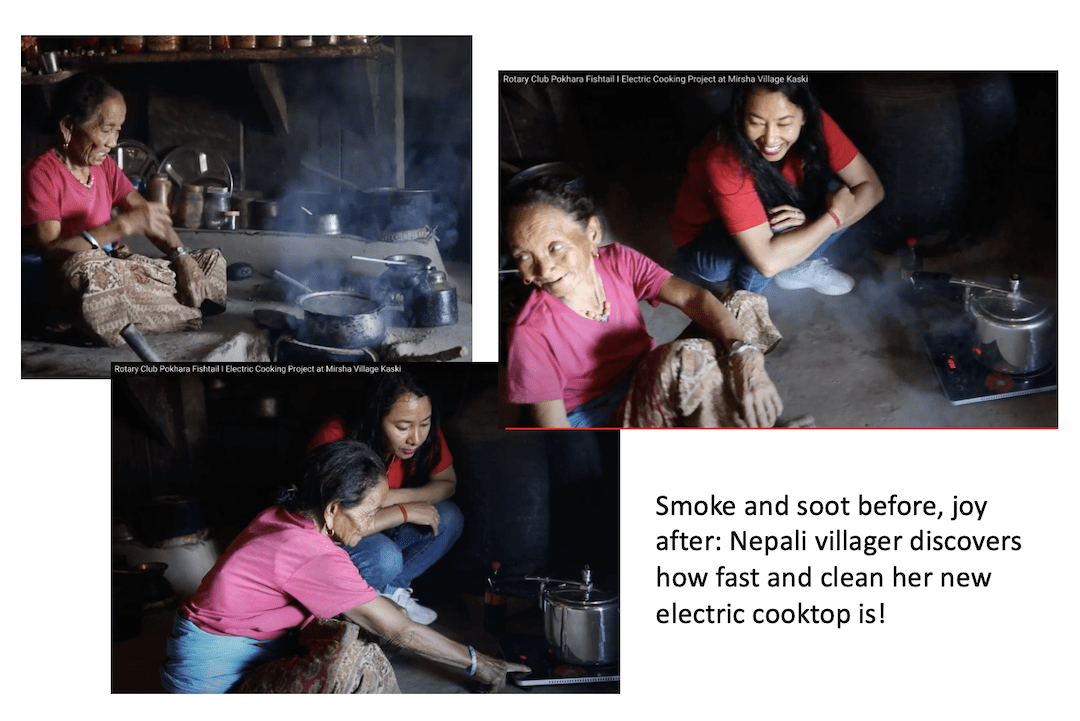by Binod Koirala, Past President, Rotary Club of Pokhara Fishtail, Nepal
Many families in Nepal still cook over fires indoors. Our club has implemented a pilot project on electric cooking stoves in two different poor communities with excellent results: indoor particulate levels fell over 96% and families cut their cooking energy costs by 60%! The cost per household was only $100, with families contributing a share. Those upgrade costs – averaging NPR. 2000 – are normally paid by the family. The typical cooking energy cost for a household with 4 family members is about NPR. 1500 per month. Once they start using electricity, that cost drops to NPR. 600 per month. So, they recover the sharing cost within few months.
Nepal is rich in clean hydro-electricity, and the government is encouraging people to use electric equipment. This creates a big opportunity to implement our e-cooking project on a larger scale and contribute to saving the environment.
In partnership with the Rotary Clubs of Bristol Breakfast (UK) and Neoteric (HK), we equipped 60 families to replace their dependence on wood or Liquified Petroleum Gas (LPG) with an electric induction cookstove. We used an air quality monitor to test fine particulate (PM2.5) levels in a house that cooked over a woodfire. The baseline PM2.5 level was 999 µ/m3, and the family reported eye irritation, headache, and respiratory problems. We then sampled the air as the family used their new electric stove. The PM2.5 level was 35 µ/m3. There were no health issues with electric stoves.
Photo: Laxmi Thapa Giri, Past President of RC Pokhara Fishtail, with a villager discovering how fast and clean her new cookstove is.
The production of clean hydro-electricity is increasing in Nepal through government and private investments. The government is encouraging people to consume more electricity, and most of the people are connected to the electric grid. However, in some communities there are distribution problems: low voltage due to lack of sufficient transformers and scattered houses. Before implementing this project, it’s essential to pre-assess a community to find out if they have sufficient voltage. We must also check and upgrade the household wiring to reduce electric shock hazards.
Those upgrade costs – averaging NPR. 2000 – are normally paid by the family. The typical cooking energy cost for a household with 4 family members is about NPR. 1500. Once they start using electricity, that cost drops to NPR. 600 per month. So, they recover the sharing cost within few months.
Most of the people don’t know about availability of such devices for cooking. They don’t know how easy is it to cook. You can see in this video how delighted they are when they find out. “After getting electric cooking stuff, it was very easy,” said one lady. “Because of my eye problem it has been so hard to cook with firewood smoke. Now I have relief. Thank you for the support.” “Thank you for giving electric cooking system,” said another lady. “It cooks food very fast. There is no need for firewood.”
We provide the induction cookstove, a pressure cooker, and an additional pot. The sensors are expensive locally ($300), but a Rotarian friend in UK provided me two at about half the price. Here is another video on how we distributed the stoves in Mirsha Village and taught people how to use them. The moment when the pressure cookers finish is pure joy!

